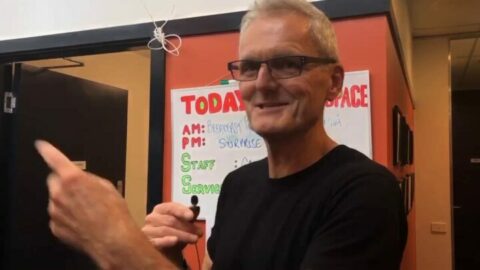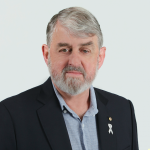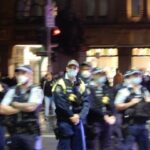The Cocaine Will Flow, Despite Police Parading Latest Seizure

Yet another image of police parading in front of a large haul of drugs appeared in the press last week. Located off the South Australian coast by the Australian Border Force on 18 March, the drugs were detected after intelligence suggested a bulk-carrier ship was being used to smuggle them in.
As the multiple blocks of cocaine weighing 416 kilograms in total were displayed before the cameras, two police officers carrying some serious-looking automatic firearms stood to the side guarding the illicit substances, just in case one of the reporters got the itch and made a last minute dash for a line.
AFP assistant commissioner Peter Harvey said four Filipino nationals had been charged in relation to the shipment and he added that the amount of cocaine, which carried a street value of $250 million, was so large it was undoubtedly destined for all major cities across the nation.
Of course, just like many other cops on the beat, at least some of the law enforcement officers present at the press conference must have been aware that despite the impressive display the bricks of coke made, it was hardly going to make a dint in the local market.
Indeed, the 100-odd years of drug prohibition has led to such a gargantuan and powerful transnational drug network that it controls the market here, and while the occasional major bust might look good for local law enforcement, it’s just a slight inconvenience for those really in charge.
Our cocaine runneth over
Greg Denham is a former Victoria police senior sergeant. He spent 15 years on that state’s force and two years serving in the Queensland Police Service. However, today, he’s one of our nation’s leading drug law reformists, who advocates for decriminalisation and an end to prohibition.
“Generally speaking, seizures have little impact on the availability of drugs,” Denham makes clear. “At most 10 to 15 percent of drugs are seized by law enforcement. And where there has been a shortage created by a drug bust, it usually has only short-term effects.”
“In terms of how this will impact the cocaine market, it’s hard to tell because cocaine use is confined mostly to hidden populations that escape the ‘police radar’,” the former senior sergeant told Sydney Criminal Lawyers.

Denham further explained that these cocaine consuming groups that fly underneath the reach of law enforcement are from the “high end”of town, and therefore, have the “financial and social capability” to escape police detection.
“Mostly the quality of the drug is impacted, and the price may increase slightly,” Denham continued, in regard to how major drug busts affect availability on the ground. “But, overall, there’s little difference, if you want to ‘get on’, you still can.”
Scoring is easy, despite the busts
Denham is the Australian representative of LEAP (Law Enforcement Action Partnership), which is a US-based nonprofit made up of current and former police officers, judges and prosecutors that was established to campaign for drugs to be treated primarily as a health issue and not a crime.
The ex-senior sergeant relates that most police he speaks to these days agree that the law enforcement approach to drugs is failing, even though senior management continue to spruik the value of major operations, like last year’s Operation Ironside.
“It’s still politically attractive to be seen as ‘tough on drugs’. It makes for great media, especially around election time or when a government is struggling to get a good news story across,” said Denham, adding that some parts of the press attack politicians for appearing “soft on crime”.
And Denham is hardly the only ex-local officer speaking out like this. Former AFP commissioner Mick Palmer explained in 2018 that between 1994 and 2001 funding for drug busts rolled in and police became “more effective”, but regardless of this, “the reality was we made no difference”.
The tide is turning
“Woven into the police-led narrative on drug busts are statements about keeping the community safe, creating a deterrent and saving lives, when actually the opposite happens,” Denham continued, adding that the busts also send the “message that police are ‘doing their job’”.
But the cracks in these sorts of narratives have been growing more apparent for some time now. LEAP originally formed under the name Law Enforcement Against Prohibition in 2002, while the Global Commission on Drug Policy declared in 2011 that “the global war on drugs has failed”.
Denham was a key campaigner in seeing the establishment of the North Richmond medically supervised injecting room in 2018. The Andrews government was finally dragged across the line on this issue by Reason Party MLC Fiona Patten, who has a knack for championing progressive policies.
While ACT Labor MLA Michael Pettersson’s legislating led to the capital territory legalising the personal possession and use of cannabis in early 2020, and now it seems very likely that a bill he’s put before parliament to decriminalise drugs in Canberra will pass.
Movement at the station
Meanwhile, Patten has just introduced a drug decriminalisation bill before Victorian parliament. And following a pattern of how she’s gotten progressive, yet controversial, laws across the line in the past, the Andrews government has agreed to conduct an inquiry into aspects of her legislation.
During a parliamentary debate on 9 March, the Victorian government resolved to set up an inquiry into one of the key aspects of the bill. A working group is to be established to investigate trialling treatment notices, which would replace being charged over personal possession and use of drugs.
“The legislation is sound and should be supported, however the perception of governments ‘going soft on crime’… means they won’t take what they believe are unnecessary ‘risks’,” Denham outlined, “especially in an election year.”
The drug law reformist further explained that a drug diversion program had been established by Victoria police in the late 90s, but it was derailed because instead of treating it as the way to deal with personal drug use, officers saw it as a one-off and laid criminal charges the next time round.
“This attitude cuts to the very heart of policing in that many see their work rewards merely in terms of arrests and convictions, rather than alternatives that may lead to better outcomes for the individual and, ultimately, the community,” Denham ended.
Receive all of our articles weekly
Related Articles
RELATED LEGISLATION
- Section 25 Drug Misuse and Trafficking Act 1985 | Drug Supply
- Section 307.1 Criminal Code Act 1995 | Importing or Exporting A Commercial Quantity of Border Controlled Drugs
- Section 307.2 Criminal Code Act 1995 | Importing or Exporting a Marketable Quantity of Border Controlled Drugs
- Section 307.3 Criminal Code Act 1995 | Importing or Exporting Border Controlled Drugs







